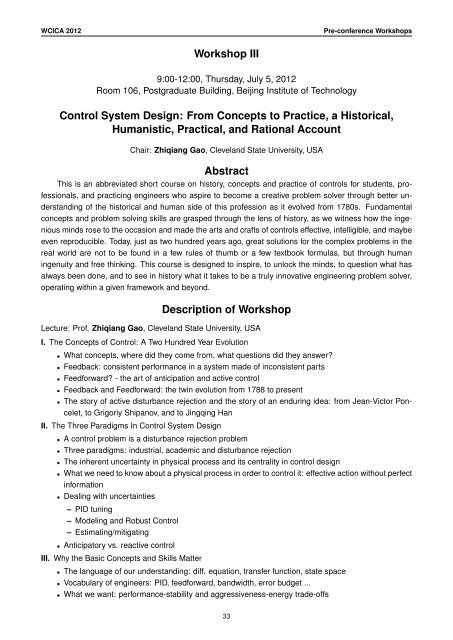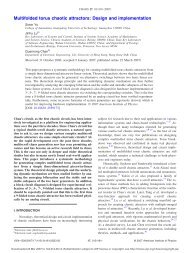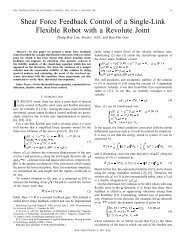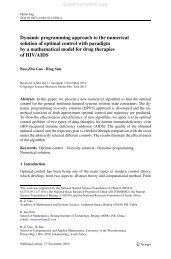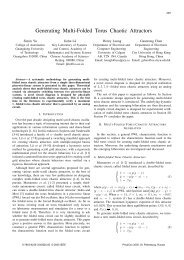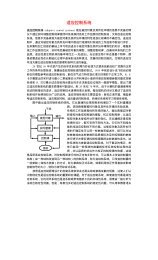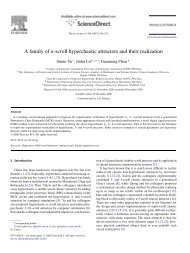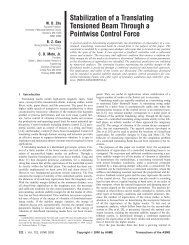Conference Program of WCICA 2012
Conference Program of WCICA 2012
Conference Program of WCICA 2012
Create successful ePaper yourself
Turn your PDF publications into a flip-book with our unique Google optimized e-Paper software.
<strong>WCICA</strong> <strong>2012</strong><br />
Pre-conference Workshops<br />
Workshop III<br />
9:00-12:00, Thursday, July 5, <strong>2012</strong><br />
Room 106, Postgraduate Building, Beijing Institute <strong>of</strong> Technology<br />
Control System Design: From Concepts to Practice, a Historical,<br />
Humanistic, Practical, and Rational Account<br />
Chair: Zhiqiang Gao, Cleveland State University, USA<br />
Abstract<br />
This is an abbreviated short course on history, concepts and practice <strong>of</strong> controls for students, pr<strong>of</strong>essionals,<br />
and practicing engineers who aspire to become a creative problem solver through better understanding<br />
<strong>of</strong> the historical and human side <strong>of</strong> this pr<strong>of</strong>ession as it evolved from 1780s. Fundamental<br />
concepts and problem solving skills are grasped through the lens <strong>of</strong> history, as we witness how the ingenious<br />
minds rose to the occasion and made the arts and crafts <strong>of</strong> controls effective, intelligible, and maybe<br />
even reproducible. Today, just as two hundred years ago, great solutions for the complex problems in the<br />
real world are not to be found in a few rules <strong>of</strong> thumb or a few textbook formulas, but through human<br />
ingenuity and free thinking. This course is designed to inspire, to unlock the minds, to question what has<br />
always been done, and to see in history what it takes to be a truly innovative engineering problem solver,<br />
operating within a given framework and beyond.<br />
Description <strong>of</strong> Workshop<br />
Lecture: Pr<strong>of</strong>. Zhiqiang Gao, Cleveland State University, USA<br />
I. The Concepts <strong>of</strong> Control: A Two Hundred Year Evolution<br />
∙ What concepts, where did they come from, what questions did they answer?<br />
∙ Feedback: consistent performance in a system made <strong>of</strong> inconsistent parts<br />
∙ Feedforward? - the art <strong>of</strong> anticipation and active control<br />
∙ Feedback and Feedforward: the twin evolution from 1788 to present<br />
∙ The story <strong>of</strong> active disturbance rejection and the story <strong>of</strong> an enduring idea: from Jean-Victor Poncelet,<br />
to Grigoriy Shipanov, and to Jingqing Han<br />
II. The Three Paradigms In Control System Design<br />
∙ A control problem is a disturbance rejection problem<br />
∙ Three paradigms: industrial, academic and disturbance rejection<br />
∙ The inherent uncertainty in physical process and its centrality in control design<br />
∙ What we need to know about a physical process in order to control it: effective action without perfect<br />
information<br />
∙ Dealing with uncertainties<br />
– PID tuning<br />
– Modeling and Robust Control<br />
– Estimating/mitigating<br />
∙ Anticipatory vs. reactive control<br />
III. Why the Basic Concepts and Skills Matter<br />
∙ The language <strong>of</strong> our understanding: diff. equation, transfer function, state space<br />
∙ Vocabulary <strong>of</strong> engineers: PID, feedforward, bandwidth, error budget ...<br />
∙ What we want: performance-stability and aggressiveness-energy trade-<strong>of</strong>fs<br />
33


